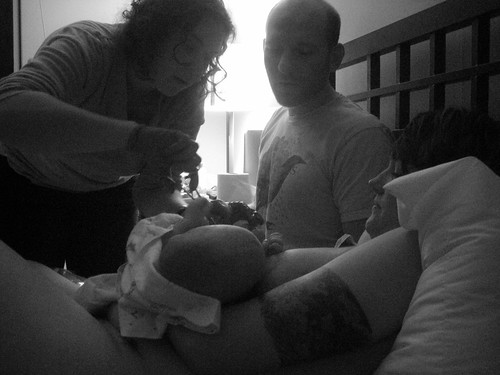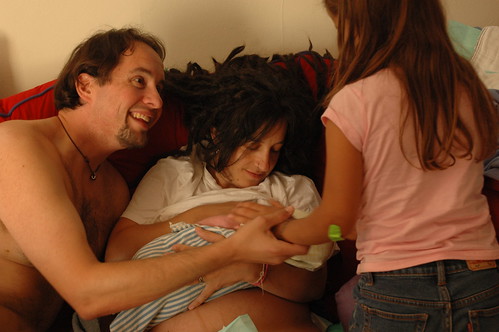The gray area of when labor starts is rarely heralded by a neat "5 min apart, lasting 1 minute, for at least 1 hour", otherwise known as 511, but, shhh, don't tell my midwifery clients. As a midwife, I can tell it in the puffed faces of my beautiful mothers, their mental desperation and physical distress at a state that is starting to feel timeless. As a mother, I recognize it in myself when I start to burn things in the kitchen, consistently, each meal is somehow derailed, for days. My mind is incredibly present, but not. It is the outward manifestation of the internal contradiction, in the the invariable discomforts of late pregnancy, I somehow find myself yearning for escape though the rhythmic pain of contractions.
 I have just felt three contractions in a half hour. They squeeze my middle, forcing me to sway my hips and breathe. The baby even pauses its passes at my ribs, seeming to wonder at the new sensations too. I call my husband at work, wanting him to be on alert in case he has to come quick. The kitchen is inside out with half finished projects, coconut date balls need to be rolled and dipped in coconut, salsa needs to be chopped and bottled, there's milk cooling for yogurt, beans bubbling for tonight's enchiladas, and a sink full of the evidence. It's at least an hour or two of work, and my labors rarely last that long. My mind is swimming between before and after. Now, I'm a pregnant mother preparing her family for her postpartum rest. After, I'm on the other side of this great battle called labor.
I have just felt three contractions in a half hour. They squeeze my middle, forcing me to sway my hips and breathe. The baby even pauses its passes at my ribs, seeming to wonder at the new sensations too. I call my husband at work, wanting him to be on alert in case he has to come quick. The kitchen is inside out with half finished projects, coconut date balls need to be rolled and dipped in coconut, salsa needs to be chopped and bottled, there's milk cooling for yogurt, beans bubbling for tonight's enchiladas, and a sink full of the evidence. It's at least an hour or two of work, and my labors rarely last that long. My mind is swimming between before and after. Now, I'm a pregnant mother preparing her family for her postpartum rest. After, I'm on the other side of this great battle called labor.I've been advised by many to listen to Surah Maryam (the Chapter of Mary) during labor. It is what fits right now. I plug in my phone to the speakers. "Kaf Ha Ya Ain Sad" rings out of the dainty speakers and reverberates through my entire being on such a physical level, that I grab the counters edge and sink down to the kitchen floor. The soothing words and rhythm continue to wash over me melding the before and after of this fragile expectant mother. I am reminded that if I die, I am a martyr, receiving the same spiritual status as a holy warrior. I weep for a forgiveness I didn't know needed forgiving. It feels like the shedding of a self, one that needs to yield in order for a momentous event to occur.
My son overhears the weeping and asks, "Are you having contractions?" Yes, I answer him, noting mentally, that no, I haven't felt them since I called my husband half an hour ago, but there is no other explanation for my unraveling in the kitchen, so I do what most mothers do and opt for expediency. I hear him tell his sister that the baby is coming. I am once again grounded by my sweet children. The dates need to be pitted. I hit 'translate' on the Qur'an app on my phone. The ayah (verse) that is playing at that moment, that pops into my phone's screen, is like a Divine answer to my misgivings, "So eat and drink and be contented". My heart swells with belief, and I am back on the staircase weeping. Allah is al-Hayy, the Living, I am not alone in this undertaking. The kitchen can wait, I finish listening to the surah before resuming my work. I imagine that this is what a soldier feels like before battle, humbled ego, and steadied heart.
After having three labors, there are some individual patterns that can be etched out. I can now say that not only does my water break before my labors, but that it does so at the beginning of the morning prayer. It's an odd pattern, but I like it.
 I'm lying in bed as my husband is rousing for fajr, when a contraction hits me so hard, I reach out for his arm. And then with a great release, the soothing warmth of amniotic fluid gushes between my legs, a message from the other side, my babies habitat for the past nine months revealed. Instantly, I am shivering and moaning through contractions. It's odd to be a midwife and a mother in labor. The contrast between the head and the heart is somehow clearer. I'm noting from a distant place, that I am in transition, right now. I tell my husband to call the midwife, but tell her not to come, the heart is wanting privacy. I am playing that mind game that mothers in labor play. We tell ourselves that this is only the beginning in order to have mental stamina for the end, and in some ways, labor really is only the beginning.
I'm lying in bed as my husband is rousing for fajr, when a contraction hits me so hard, I reach out for his arm. And then with a great release, the soothing warmth of amniotic fluid gushes between my legs, a message from the other side, my babies habitat for the past nine months revealed. Instantly, I am shivering and moaning through contractions. It's odd to be a midwife and a mother in labor. The contrast between the head and the heart is somehow clearer. I'm noting from a distant place, that I am in transition, right now. I tell my husband to call the midwife, but tell her not to come, the heart is wanting privacy. I am playing that mind game that mothers in labor play. We tell ourselves that this is only the beginning in order to have mental stamina for the end, and in some ways, labor really is only the beginning.The morning prayers are said, and we are descending the staircase so these moans of "Ooooopppppeeennn" do not wake the sleeping children. By the time we make it to our living room, the birth room, I am nauseous and hot. I want a wet washcloth, and a woman's knowing touch. My beloved midwife lives less than a mile away. "Call her", I tell my devoted husband who is fumbling with the birth tub pump. She answers and says, I'm already on my way, did we think she was waiting for another call? Oh midwives, the good ones capture that difficult place between knowing and unknowing with such skill and wit.
I am sending each contraction into circles of movement, from hips to cervix. I can't imagine not circling my hips. "Ya Latif", O Gentle One, I mutter weaving this sentiment into these circles. I am connected to my Muslim sisters from Afghanistan to Senegal, who have uttered this Divine name through their contractions for centuries. They become my companions through these giant, urgent waves. I can do this too.
The birth tub is inflated, but dry, as I am feeling the first urges to push. There is no time to fill it. I have never done this without the tub and I am nervous. How do I push outside of the tub? The answer soon becomes clear, you just do. Twenty minutes later, my nine pound baby boy is born. We have named him Ya Sin, a name without direct meaning, yet fraught with Divine mysteries and meanings. It is what I felt throughout this pregnancy, and the earliest twinges of labor, a knowing beneath the surface, that if trusted and sought, will open up worlds of understanding. May Allah bless him, and all babies and mothers everywhere. Our children truly are here to teach us, from their conception, to adulthood. I am grateful to learn.
Post Note: We wanted to say a special thank you to our other stellar midwife Lael, who not only made the birth hours before leaving on vacation, but brought us a dozen eggs from her chicken to nourish us and continue the cycle.









